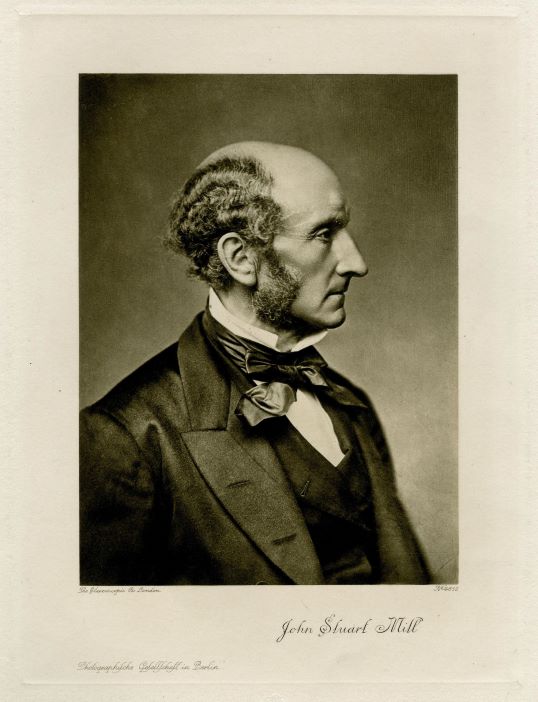Liberty Matters
Mill on Reform and Compensation

Professor Ebeling has provided ample evidence of Mill’s antislavery position, including his role as speaker for the Jamaica Commission, which sought to punish Governor Eyre for his harsh treatment of former slaves in the Jamaican uprising. More information can be found in “The Secret History of the Dismal Science.” Part III: “The Governor Eyre Controversy”.[98] The Judy cartoon posted previously, with the portrait of Eyre hanging behind Mill dressed as a woman, makes clear that Mill’s role against Eyre was well known at the time!
It is worth noting that Mill’s vision of reform is one which takes the status quo seriously, in a way that economists trained in the Kaldor-Hicks tradition rarely recognize.[99] For Mill, movement away from even a status quo that is immoral will require a trade, compensation. This was true no less for slavery than it was for other less radical reforms. Thus in his Political Economy Mill wrote:
Whether the object [of reform] be education; a more efficient and accessible administration of justice, reforms of any kind, which, like the Slave Emancipation, require compensation to individual interests; every one of these things implies considerable expense, and many of them have again and again been prevented by the reluctance which, though ... the cost would be repaid, often a hundredfold, in more pecuniary advantage to the community generally.[100]
For Mill and for the politicians who worked out the elaborate trade for emancipation, it was necessary and indeed fitting that former slave owners would be compensated by an agreed-upon sugar tariff. For Mill’s opponents, including Thomas Carlyle, it would be better to continue with slavery than to have British taxpayers pay for its abolition.
In contrast to the tradition of actual compensation, with the coming of new welfare economics, reforms could be pronounced efficient on the grounds that a compensation making all parties better off could be imagined; a reform for which compensation might be imagined to increase total happiness was said to be Kaldor-Hicks efficient. Such a change in economic analysis placed the economist in the role of advising policymakers on the basis of apparently expert knowledge about total welfare and the allotments that would accrue to various people.
Endnotes
[98.] David M. Levy and Sandra J. Peart, "The Secret History of the Dismal Science. Part III. The Governor Eyre Controversy," Econlib June 4, 2001. <https://www.econlib.org/library/Columns/LevyPeartdismal3.html>.
[99.] See, Kaldor, Nicholas. 1939. “Welfare Propositions of Economics and Interpersonal Comparisons of Utility,” Economic Journal 49: 549-52; and Hicks, John R. 1939. “The Foundations of Welfare Economics,” Economic Journal 49: 696-712.
[100.] J.S. Mill, Principles of Political Economy, p. 866. Book V: On the Influence of Government, Chap. VI: Comparison between direct and indirect taxation, </titles/243#lf0223-03_label_1314>.
Copyright and Fair Use Statement
“Liberty Matters” is the copyright of Liberty Fund, Inc. This material is put on line to further the educational goals of Liberty Fund, Inc. These essays and responses may be quoted and otherwise used under “fair use” provisions for educational and academic purposes. To reprint these essays in course booklets requires the prior permission of Liberty Fund, Inc. Please contact oll@libertyfund.org if you have any questions.